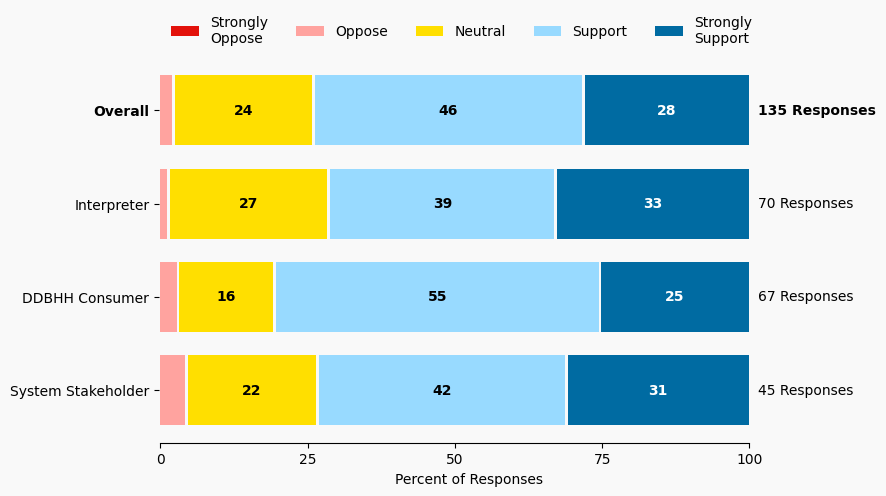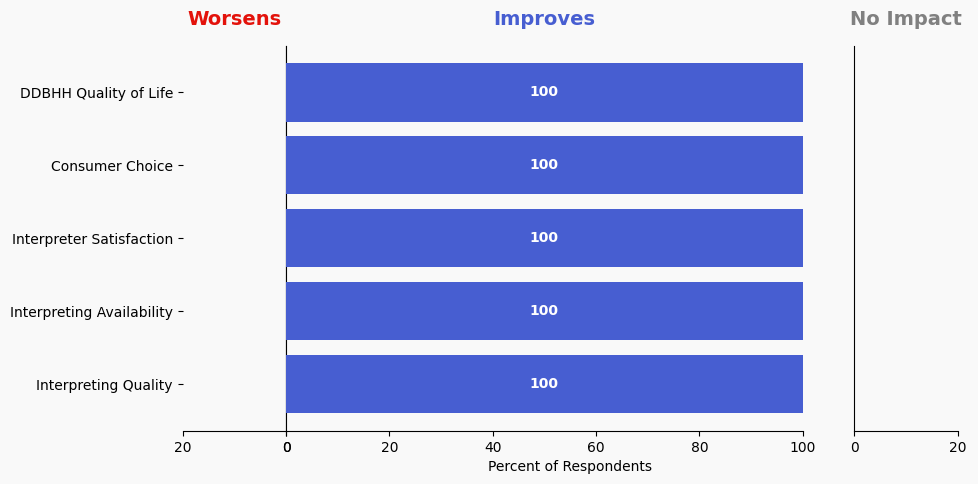16 Recognize Less Frequent Specialty Areas of Interpreting
Issue: No widespread standards exist for some specialty areas of interpreting. Few specialty areas have assessments, credentialing or training programs. Interpreters can participate in the following training programs. Qualified Mental Health Interpreter Deaf Blind Interpreter ProTactile Language Interpreter NTID’s Master of Sciences in Health Care Interpretation NTID’s Certificate in Health Care Interpretation Interpreters can currently sit for the following specialist credentials. Texas’ Board of Evaluation of Interpreters Certification Program (BEI): Medical, Court, Trilingual (Spanish) Core Certification Healthcare Interpreter™ (CoreCHI™) certification is for any language, not specific to ASL. Educational Interpreter Performance Assessment (ASL English K12 educational assessment) RID formerly offered the below certificates. CASLI (the entity now offering certificates that RID recognizes) does not currently offer: Specialist Certificate: Legal Specialist Certificate: Performance Arts Conditional Legal Interpreting Permit – Relay (CLIP-R) Oral Interpreting certificates For other areas of specialty that are not listed above, there are no standards for training or assessing interpreters’ skills in interpreting for other specializations.
Proposed Solution: Coalition to convene a working group to research the need for training, standards and credentialing in “new” specialized areas of interpreting.
Expected outcome: Conducting research will provide more comprehensive information about what speciality credentials are already available and what gap areas there are for specialty training and credentialing.
Who is impacted: Interpreters working in specialized settings; consumers wanting interpreters with demonstrated skills and knowledge in specialized areas.
Timeline: 6 months

Summary of Support Image Description
The stacked bar charts show how respondents rated their level of support and the total number of responses. The percentage for the five support levels is shown from left to right: Strongly Oppose (Dark Red), Oppose (Light Red), Neutral (Yellow), Support (Light Blue), and Strongly Support (Dark Blue).
Respondents may identify with multiple subgroups. The overall level of support is:
Overall
Strongly Oppose: 0%
Oppose: 2%
Neutral: 24%
Support: 46%
Strongly Support: 28%
Click to see the detailed image description for each subgroup.
Interpreter
Strongly Oppose: 0%
Oppose: 1%
Neutral: 27%
Support: 39%
Strongly Support: 33%
DDBHH Consumer
Strongly Oppose: 0%
Oppose: 3%
Neutral: 16%
Support: 55%
Strongly Support: 25%
System Stakeholder
Strongly Oppose: 0%
Oppose: 4%
Neutral: 22%
Support: 42%
Strongly Support: 31%
Overview of Respondents Opting for In-Depth Solution Analysis
After indicating their support level, 3% of the 135 respondents opted in to further assess whether the solution would worsen or improve on five metrics. Of the opt-in reviewers (5 respondents), 100% supported the solution, 0% were neutral on the solution, and 0% opposed the solution.
The remaining 130 respondents did not opt in to further assess the solution. Of these people, 73% support the solution, 24% were neutral on the solution, and 2% opposed the solution.
Reviewer Evaluation of Solution Effectiveness

Solution Effectiveness Image Description
The stacked bar charts show how respondents assessed the effectiveness of this solution based on five metrics. For each metric, the percentage of respondents is shown from left to right: Worsens (Red), Improves (Blue), No Impact (Gray).
DDBHH Quality of Life
Makes It Worse 0%
Makes It Better 100%
No Impact 0%
Interpreter Satisfaction
Makes It Worse 0%
Makes It Better 100%
No Impact 0%
Consumer Choice
Makes It Worse 0%
Makes It Better 100%
No Impact 0%
Interpreting Availability
Makes It Worse 0%
Makes It Better 100%
No Impact 0%
Interpreting Quality
Makes It Worse 0%
Makes It Better 100%
No Impact 0%
Reviewer Feedback and Insights
Interpreter
Comments from Interpreters suggest incorporating BEI certification into Minnesota laws and developing state-specific specialist training, potentially funded by grants. One comment highlights the need for clearer standards and more detailed information on specialty areas.
Deaf, DeafBlind, Hard of Hearing
Comments from DDBHH Consumers express concerns about funding sustainability and suggest involving DDBHH community members in curriculum or certification development.
System Stakeholder
Comments from System stakeholders raise similar concerns about funding and suggest involving DDBHH members in curriculum creation. One comment asks whether Minnesota should create its own specialized training, supported by grant funding.
PREVIOUS SOLUTION
15 Create a Central State Government Interpreting Services Office
Issue: Burden on individual state agencies for interpreting costs; no central state model of excellence in interpreting. With the One Minnesota campaign, the philosophy falls short and penalizes entities with DDBHH employees, as well as penalizes state agencies that have to pay for interpreting services.
NEXT SOLUTION
Issue: Concerns have been raised about interpreters’ pay and benefits.
Leave a Reply